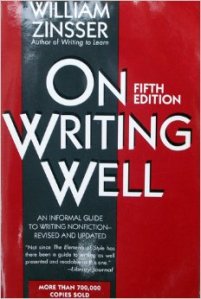 I came to what I call professional writing fairly late. I didn’t take it seriously until my real life eased enough for me to give some attention to what I might want to do with the rest of my days.
I came to what I call professional writing fairly late. I didn’t take it seriously until my real life eased enough for me to give some attention to what I might want to do with the rest of my days.
After dabbling in every artistic expression of my day–needlework, crochet, macrame, pottery, ceramics, drawing in charcoal and pastels, painting in oils, acrylics, and watercolor–none of which I did well, I finally realized that my early love, writing, was the creative outlet I had been looking for all along.
I joined a local writing group and there I found William Zinsser, their anointed guru. They couldn’t stop talking about his book, “On Writing Well”. It was their bible and I, more interested in hamper-free, no-rules writing, was having none of it. I didn’t want to be told how to write, I wanted to be told I wrote well, even when I didn’t. That was the whole point of joining a writing group. Or so I thought at the time.
Zinsser, when I finally opened up to him, taught me otherwise. Good writing takes skill. There is no easy way to acquire it and the sooner the novice realizes it, the easier it is to look at the beginnings as school–lessons, grades, apprenticeships. And then you go to work, where you find that you don’t know everything after all, and that, as in any other profession, the learning never stops.
I’m still a dummy when it comes to grammar and sentence structure. I’m always imagining the “Oh, God, no” reactions from the more knowledgeable people who take on the task of reading what I write. I don’t always get it–what can I say? But William Zinsser gave me the reasons to write. Yes, he was a stickler for grammar and sentence structure, but his main focus was not so much on doing it right as on doing it well.
In honor of his life and skills, in sadness at his passing, here are a few passages from “On Writing Well” (Fifth Edition):
Trust your material if it’s taking you into unknown terrain you didn’t intend to enter but the vibrations are good. Adjust your style and your mood accordingly and proceed to whatever destination you reach. Don’t ever become the prisoner of a preconceived plan. Writing is no respecter of blueprints–it’s too subjective a process, too full of surprises.
Writing is hard work. A clear sentence is no accident. Very few sentences come out right the first time, or even the third time. Remember this in moments of despair. If you find that writing is hard, it’s because it is hard. It’s one of the hardest things people do.
The good writer of prose must be part poet, always listening to what he writes. E.B White continues to be my favorite stylist because I’m conscious of being with a man who cares about the cadences and sonorities of the language. I relish (in my ear) the pattern his words make as they fall into a sentence. I try to surmise how in rewriting the sentence he reassembled it to the end with a phrase that will momentarily linger, or how he chose one word over another because he was after a certain emotional weight. It’s the difference between say, “serene” and “tranquil”–one so soft, the other strangely disturbing because of the unusual n and q.
Writing is not a contest. Every writer is starting from a different point and is bound for a different destination. Yet many writers are paralyzed by the thought that they are competing with everyone else who is trying to write and presumably doing it better.
Decide what you want to do. Then decide to do it. Then do it.
Mr. Zinsser, I wish I had said this before, but you’ll understand if I feel the need to say it now.
Thank you. It didn’t always take (living proof), but you gave it your best. You never stopped trying. And that’s what counts.


So well done and writing is hard but the process open your eyes to nuances and the words have a dance…
LikeLike
Thank you, Nedra. Nothing like it in the world. I love it, even when it’s tough.
LikeLike
Wonderful advice.
LikeLike
Proof that you can never revise enough: I’ve rethought the ending and decided I needed to explain that I’m really not so great but it’s not Zinsser’s fault. Lol.
LikeLiked by 1 person
So what you are saying is
I struggle with production versus perfection. I think it was Stalin [oh my] who said, “quantity has a quality all its own”. While I loathe to quote the man, I realize that the more I write and the less I agonize over rewriting, the easier it is to produce quality.
LikeLike
My attempts are just pitiful. I’ve made three small revisions since i commented and I’m contemplating another one. Maybe it’s the Zinsser factor. I don’t know. I’m taking this to heart:
“Writing is hard work. A clear sentence is no accident. Very few sentences come out right the first time, or even the third time. Remember this in moments of despair. If you find that writing is hard, it’s because it is hard. It’s one of the hardest things people do.”
I’ll get over it. I always do.
LikeLike
I think your post is great, constantcommenter. I had/have the “I didn’t want to be told how to write” view you mentioned, but I must admit that the famous Zinsser book you described so well sounds excellent.
LikeLike
Darn — I meant to write “constantcommoner.” My apologies. 😦
LikeLike